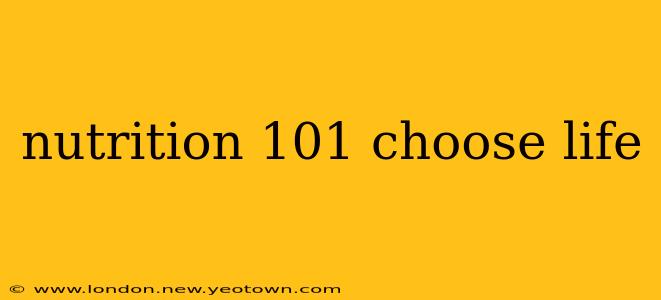Choosing life isn't just a catchy phrase; it's a daily commitment, and a significant part of that commitment involves nourishing your body with the right foods. This isn't about restrictive diets or fleeting trends; it's about building a sustainable relationship with food that fuels your energy, sharpens your mind, and enhances your overall well-being. Let's dive into Nutrition 101 – your roadmap to a healthier, happier you.
What are the Basic Nutrients?
Understanding the fundamental building blocks of a healthy diet is the first step. We're talking about macronutrients and micronutrients – the powerhouses that keep your body running smoothly. Imagine them as the essential ingredients in a delicious recipe for life.
-
Macronutrients: These are the energy providers. We have carbohydrates (your primary energy source), proteins (crucial for building and repairing tissues), and fats (essential for hormone production and cell function). Think of them as the main courses in your daily nutritional meal plan. Finding the right balance between these macronutrients is key to feeling energized and healthy.
-
Micronutrients: These are the vitamins and minerals, the essential spices and herbs that add flavor and boost the overall health of your "recipe". They work in conjunction with the macronutrients to support various bodily functions, from immune response to bone health. A diverse diet rich in fruits, vegetables, and whole grains naturally provides a wide array of these vital micronutrients.
What are the Different Types of Diets?
The world of diets can feel overwhelming, with countless approaches promising quick fixes. However, sustainable healthy eating isn't about following a specific "diet," but rather adopting healthy eating habits. Instead of focusing on restrictive diets, consider these approaches:
-
The Mediterranean Diet: This plant-based approach emphasizes fruits, vegetables, whole grains, legumes, nuts, and olive oil. It’s rich in antioxidants and healthy fats, often associated with longevity and heart health.
-
The DASH Diet: Designed to lower blood pressure, the DASH diet prioritizes fruits, vegetables, whole grains, and lean protein while limiting sodium, saturated fat, and added sugars.
-
Flexitarian Diet: This flexible approach emphasizes plant-based foods but allows for occasional meat consumption. It’s a great option for those wanting to reduce their meat intake gradually.
Ultimately, the "best" diet is the one you can maintain consistently. Focus on nutrient-dense whole foods and build a sustainable eating pattern that you enjoy.
How Much Protein Do I Need Daily?
The amount of protein you need daily depends on several factors, including your activity level, age, and overall health goals. General recommendations suggest aiming for 0.8 grams of protein per kilogram of body weight. However, athletes or individuals with specific health conditions may require more. It's always best to consult a registered dietitian or healthcare professional for personalized guidance.
Remember, protein isn't just about muscle growth; it's essential for various bodily functions, including hormone production, enzyme activity, and immune function.
What are the Benefits of Eating a Balanced Diet?
The benefits of a balanced diet extend far beyond simply maintaining a healthy weight. A nutritious diet is a cornerstone of overall well-being, contributing to:
-
Improved Energy Levels: A balanced intake of macronutrients provides sustained energy throughout the day, preventing those dreaded energy crashes.
-
Stronger Immune System: Micronutrients play a critical role in bolstering your immune defenses, helping your body fight off illness.
-
Enhanced Mental Clarity: Nutrients support brain function, promoting focus, concentration, and mood regulation.
-
Reduced Risk of Chronic Diseases: A balanced diet significantly reduces the risk of developing chronic conditions like heart disease, type 2 diabetes, and certain cancers.
Choosing a life of healthy eating is an investment in your future self. It's a journey, not a race. Start small, make gradual changes, and remember that consistency is key. Consult with a healthcare professional or registered dietitian for personalized advice tailored to your specific needs and goals. Choose life, choose wellness, choose nourishment.

